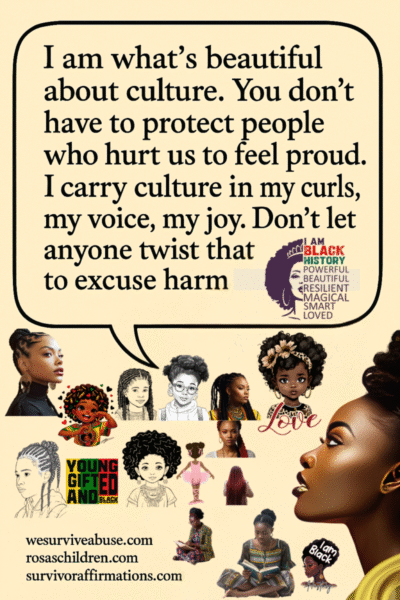The truth is not quiet. The truth is not polite. The truth is not neutral. And neither are predators. Too many of us watched it happen in real time.P
The truth is not quiet. The truth is not polite. The truth is not neutral. And neither are predators.
Too many of us watched it happen in real time.
People made jokes. Played the music. Quoted the lyrics.
And danced on the backs of Black girls and women whose pain they refused to face.
It wasn’t just R. Kelly.
This is a pattern. A sickness. A silence we’ve dressed up as culture.
It’s time we tell the truth.
Here’s how communities and families normalize predators—and why this leaves victims bleeding and betrayed.

1. They protect the predator’s talent, reputation, or income over the victim’s life.
They say:
“But he’s so gifted.”
“But look how far he came.”
“But that’ll ruin his career.”
They never ask how abuse ruins the body, heart, or future of a girl.
2. They demonize the ones who speak up.
The first ones to scream aren’t embraced—they’re exiled.
“You just want attention.”
“You’re messy.”
“You trying to bring a Black man down.”
No. She’s trying to breathe again.
3. They treat predatory behavior like a “family secret” instead of a crime.
It’s hushed. Whispered.
But no action is taken.
“Don’t leave the kids with him” is not the same as reporting him or at least stopping him from coming around.
That’s not safety. That’s complicity.
4. They blame the child for being ‘fast’ instead of the adult for being predatory.
She wore a short skirt?
She walked by herself?
She developed “early”? (How does a child do this?)
None of that makes her responsible for being hunted.
5. They separate the art from the artist but refuse to separate the victim from their pain.
R. Kelly’s music plays at weddings, reunions, BBQs.
Meanwhile, Survivors hear a soundtrack to their own violation. They hear that you don’t care about child safety or the violation of women and children. They hear that you don’t care about the Survivors in the room and how this may be impacting them.
No pause. No apology. As long as you get to keep on dancing.
6. They weaponize “forgiveness” to silence victims.
“Let it go.”
“God will handle it.”
“You’re holding on to bitterness.”
But what they mean is:
Stop making us uncomfortable with your truth.
7. They guilt victims for ‘breaking the family up’ instead of blaming the abuser for their actions.
The predator becomes the victim.
The actual victim becomes the scapegoat.
And the cycle keeps spinning—because the truth was too heavy to hold.
8. They make abuse the victim’s personality instead of the predator’s responsibility.
“She’s difficult.”
“She’s always angry.”
“She needs therapy.”
She needs protection.
She needs you to stop making room for the one who harmed her.
9. They excuse abusive men as being ‘troubled’ but never excuse the victim’s trauma responses.
He was “going through something.”
He “didn’t have a father.”
He “has a good heart.”
But she’s labeled damaged, dramatic, bitter, and “too much.”
10. They joke about it to make it less real.
The memes.
The skits.
The viral soundbites.
They turn Survivors’ stories into content—while Survivors fight to keep breathing.
11. They keep inviting predators back into sacred spaces.
Barbecues.
Churches.
Choir stands.
Classrooms.
He gets a seat.
She gets a warning.
“Don’t cause a scene.”
12. They treat Survivors like a problem to contain instead of a truth to protect.
Survivors are labeled divisive.
They get cut off.
They’re told they’re angry, unforgiving, or “bringing shame.”
But the shame belongs to the abuser. The silence belongs to the enablers.
🔥 And Here’s the Cost…
Every time we normalize a predator, we destroy a Survivor’s hope.
Every time we play his music at public functions we drown out her voice.
Every time we say “that’s just how he is,”
We tell a young girl,
“No one is coming for you.”
That ends here.
That ends with us.
🧱 You want to protect Black women and girls?
Stop playing the songs at public gatherings.
Start protecting the Survivors.
Don’t just cancel predators—cancel the silence.